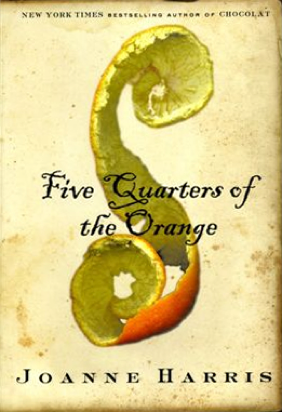Patricia Bertschy Reviews
Five Quarters of the Orange
A novel by Joanne Harris
Author of the New York Times bestseller, Chocolat
William Morrow, HarperCollins, 2001
Five Quarters of the Orange is the story of a mother and daughter and their life-long struggle to understand one another.
This engagingly written narrative is set in German-occupied France during World War II. Framboise is the independent and determined daughter of Mirabelle Dartigen. Mirabelle is tormented by a demon illness; she vacillates between volatile outbursts and stoic resolve. She shows little motherly tenderness towards her youngest daughter, but a fierce, uneven love for her family.
The appeal of Five Quarters is not only the story of the mother/daughter struggle, but also the layers of mystery that surround them.
When Mirabelle dies, she leaves her children their inheritance: the farm to the oldest son, Cassis; the valuable contents of the wine cellar to her older daughter, Reine-Claude; and an album to Framboise.
The album is a hodge-podge of recipes, herbal cures and notes scribbled in the margins. Some of the notes seem to be written in a language that Framboise does not recognize. Framboise wonders about the intention behind her mother's bequest. Her brother, Cassis, tells her she was given the album because she was her mother's favorite.
The firestorm that was the relationship between mother and daughter is the main thread of the story. We see little love between Mirabele and her youngest daughter. Her mother is distant and Framboise torments her without feeling guilty.
At nine years old, Framboise is "the troublesome one, the discordant one. …sullen and defiant." She goads and antagonizes her mother. She finds her mother's weaknesses and exploits them; her mother responds with "bewildered rage."
After her mother's death, Framboise returns to her childhood home in Las Laveuses. Because her family had left abruptly and in shame, she hides her identity from the villagers. Using many of the recipes in her mother's album, she opens a small creperie but soon finds herself threatened by those who want to expose her.
As Framboise begins to read and decipher the margin notes of her mother's album, we learn the story of her family's clandestine contacts with the German occupation soldiers. The author tells the story through Framboise, alternating between flashbacks of her 9-year-old's memories and the wiser perspective of the adult.
As a child, Framboise sought adventure and was drawn to the excitement of the presence of the soldiers in her small town. More cunning and adventurous than her siblings, she forced her older brother and sister to include her in their meetings. The events that followed, even with Framboise's tenacity, were more than she was ready for.
She was more insightful and more conscience-driven than her siblings and where they are damaged and swallowed up by what occurs, Framboise becomes stronger, wiser and more determined.
Joanne Harris' writing is direct yet elusive. As Framboise continues to discover the meaning behind the margin notes, we gain glimpses into the events of her childhood. Harris expresses complex emotions in straightforward, stripped-down, yet pointed prose: "I loved him - not in the searing, desperate way I loved Tomas; but enough."
Five Quarters is written without sentimentality, but is powerful. It evokes strong feelings from the reader for mother and daughter and their painful struggle. We are moved with compassion as we realize how much they share - a longing for connection, love and understanding.
As Framboise unravels the mysteries of her mother's life, we hope that she will gain the same compassion. Perhaps she will move from hostile indifference to deep empathy, an appreciation that she could not possibly have felt as a young girl.

Available at
www.Amazon.com
www.harpercollins.com
www.barnesandnoble.com
Patricia Bertschy is an avid reader who lives on Cape Cod.
She was recently awarded a scholarship to attend this summer's Cape Cod Writers Center Conference, held at the Craigville Conference Center, for her nonfiction story "Discovery."
Patricia was also named one of five finalists in the Norman Mailer Cape and Islands Community College Writing Awards for a work of non-fiction titled "The Long Walk".
At a January 22nd ceremony, Pat was awarded third prize in PrimeTime Cape Cod magazine's 2010 Writing Contest for Poetry and Prose, for her short story, "The Dress."
 |
